27 Sep 16 | Awards, Fellowship, Fellowship 2016, Middle East and North Africa, News and features, Syria
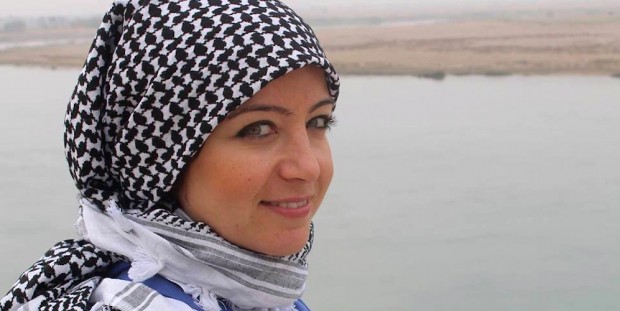
This week, UN officials described the Syrian regime’s offensive against the besieged city of Aleppo as “barbaric”. Following the collapse of a short-lived ceasefire, Syrian forces again began bombing Aleppo on Sunday, a continuation of the “unrelenting onslaught of cruelty”.
Aleppo is the former home of Zaina Erhaim, activist, journalist and winner of the 2016 Index on Censorship award for journalism for her work training citizen journalists to report on the conflict within the city.
|
Zaina Erhaim is the 2016 Index on Censorship Freedom of Expression Journalism Award-winner and fellow. A Syrian native who was studying journalism in London when war broke out in Syria in 2013, Erhaim decided to return permanently to report and train citizen journalists in the war-ravaged country. Read more about Erhaim’s work.
|
|
The battle for Aleppo has been raging since 2012, the same year Erhaim’s husband, the activist Mahmoud Rashwani, was arrested and tortured by the Syrian regime for participating in peaceful protests.
Writing on 11 August 2016 Erhaim – who now lives in Turkey with the couple’s seven-month-old daughter – said: “Among the estimated 300,000 to 400,000 people living on Aleppo’s eastside, Mahmoud hadn’t had any vegetables or fruit for the past month.”
She added that shortages of food – from fresh produce and canned food, to eggs, flour and baby milk – along with a lack of fuel have have left the people of Aleppo increasingly vulnerable.
Speaking to Index on Censorship, Erhaim said she was “incredibly proud” about her husband’s “brave” work searching for survivors among the rubble of bomb out buildings in Aleppo alongside other volunteers.
On 15 August, it was Rashwani’s neighbour’s home which was left in ruins. The neighbour – a journalist – along with his pregnant wife, were killed, while Rashwani escaped with a knee injury, Erhaim told Index.
Rashwani’s home, which he shared with Erhaim before she left the city, was also damaged.
Rashwani travels between Syria and Turkey to be with his family, but the journey has become increasingly difficult as the war rages on, Erhaim said.
Erhaim herself faced difficulty with a border this week. Travelling from Istanbul on 22 September to attend an event organised by Index on Censorship, border officials at Heathrow airport held the activist and her child for an hour before confiscating her passport after it was reported by the Syrian authorities as stolen. She was told that her passport would have to be returned to the Syrian government.
Erhaim was able to enter the UK on an old passport. However, this passport is now full, making future travel plans and visa applications potentially impossible.
Now back in Turkey, she will continue to work on projects with the Institute for War and Peace Reporting, she told Index. She is in the process of selecting five activists for a filmmaking project and has just completed hostile environments, first aid and digital security training with a number of journalists – essential skills for anyone reporting from Syria.
Erhaim will also continue to work on the Women’s Blog on The Damascus Bureau, which has just received a book deal from a French publisher. “The first edition will be in French and will be followed by editions in Arabic and English,” she told Index.
Speaking ahead of the Index event on women who report from war zones, Erhaim told Index: “The voices of women are very important because they are telling what is happening behind the frontline. While the major concern for most of the men in these situations is the actual conflict, women also think about education, health systems, clinics, social traditions, the changes in wedding styles – they are reporting on life.”
Nominations are now open for 2017 Index on Censorship Freedom of Expression Awards and will remain open until 11 October. You can make yours here.
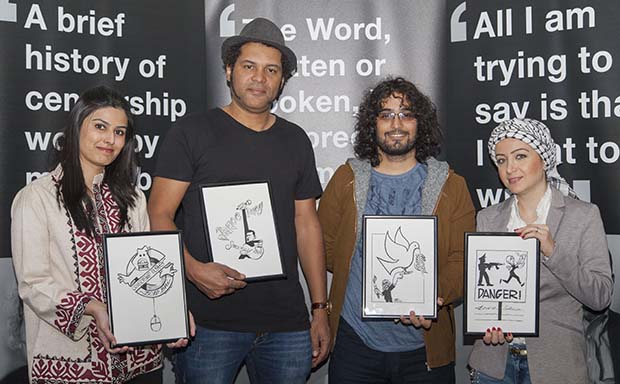
Winners of the 2016 Freedom of Expression Awards: from left, Farieha Aziz of Bolo Bhi (campaigning), Serge Bambara — aka “Smockey” (Music in Exile), Murad Subay (arts), Zaina Erhaim (journalism). GreatFire (digital activism), not pictured, is an anonymous collective. Photo: Sean Gallagher for Index on Censorship
More about Zaina Erhaim
Index condemns UK’s seizure of award winner’s passport
Women on the front line: Zaina Erhaim and Kate Adie on the challenges of war reporting
Zaina Erhaim: “I want to give this award to the Syrians who are being terrorised”
#IndexAwards2016: Zaina Erhaim trains Syrian women to report on the war
26 Sep 16 | Europe and Central Asia, Events, Norway

To mark the release of Norwegian musician Moddi’s new album, Unsongs, Index on Censorship is proud to announce a special series of appearances by currently banned voices from around the world.
Moddi will hand over the stage at three of the biggest gigs on his current European tour to unleash the power of free expression, replacing the support band with the genuinely banned.
In Amsterdam on 1 October, Maryam Al-Khawaja will share her and her family’s story of imprisonment and exile in the struggle for democracy in Bahrain. In London on 3 October, Vanessa Berhe will speak about life in the prison state of Eritrea and her campaign One Day Seyoum fighting to free her journalist uncle Seyoum Tsehaye who has been in jail for 15 years. In Berlin on 6 October, Raqqa Is Being Slaughtered Silently will tell how the Syrian civil war has destroyed the free expression of a generation. Co-founder Abdalaziz Alhamza will share the story of how and why he co-founded it inside IS-controlled territory.
“Unsongs is a remarkable collection of songs that have, at one stage, been banned, censored or silenced. The attempts to suppress them were as mild as an airplay ban and as brutal as murder. With great sensitivity and imagination, Norwegian singer-songwriter Moddi has given them new life and created a moving and eye-opening album. Unsongs simultaneously celebrates the censored and exposes the censors.” – Dorian Lynskey
Amsterdam, Jeruzalemkerk, Saturday 1 October, 8:30pm
The Banned: Maryam Al-Khawaja (Bahrain)
Tickets
London, St. Giles-In-The-Fields, Monday 3 October, 8pm
The Banned: Vanessa Berhe (Eritrea)
Tickets
Berlin, Silent Green, Thursday 6th October, 8pm
The Banned: Raqqa Is Being Slaughtered Silently (Syria)
Tickets
The series will be launched with a live Twitter chat with Moddi and Index on Censorship on Thursday 29 September at 3pm. Ask Moddi a question using the hashtag #WithTheBanned.
26 Sep 16 | Europe and Central Asia, Event Reports, Middle East and North Africa, mobile, News and features, Syria, United Kingdom
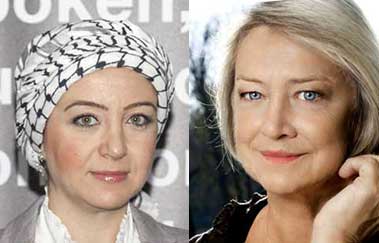
Journalists Zaina Erhaim and Kate Adie spoke at Write on Kew. (Photos: Sean Gallagher, Ken Lennox)
On 24 September Index on Censorship’s CEO, Jodie Ginsberg, gathered with former BBC chief news correspondent Kate Adie and 2016 Index award-winning journalist Zaina Erhaim in Kew Gardens to discuss journalism in war zones and what it’s like to be a woman reporting from crisis points.
Kate Adie has been a prominent figure in journalism since the 1980s, covering, among other major events, the 1980 London Iranian Embassy siege, the Tiananmen Square protests, the Rwandan Genocide and the war in Sierra Leone. After 14 years as BBC’s chief news correspondent, Adie now works as a freelance journalist, author and presents From Our Own Correspondent on BBC Radio 4.
Zaina Erhaim is a Syrian journalist known for her activism in Aleppo and teaching journalism skills to the men and women in Syria. Erhaim currently works as the Syria project coordinator with the Institute for War and Peace Reporting.
Ginsberg asked Adie and Erhaim what influenced them to become journalists. Erhaim said her mother was the only family members that supported her career choice. The rest of her relatives told her: “Nobody wants to marry a journalist.”
Growing up in a conservative society where the regime censored everything, Erhaim was inspired to study journalism in the UK. After the escalation of the war in Syria, Erhaim knew that she could never abandon her home in Aleppo. She returned to the ravaged city to train journalists, particularly women, to spread the untold stories of those hurt by the war.
Adie discussed how her generation was affected by the aftermath of World War II, with women being incorporated into the workforce during warfare then pushed “back to the kitchen” after the war ended. She admits that growing up she had no expectations for her career, but after visiting East Berlin during the Cold War, she discovered that the rest of the world was not as comfortable as the one she grew up in, fueling her desire to become a journalist.
Exploring the challenges woman face in journalism, Adie said that there were obvious concerns in countries that view women as secondary beings. The fear of being raped or assaulted is always present, she said, adding that there are judicial systems in place that could see her imprison for being a female out alone in public.
Adie emphasised that she does not like to be portrayed as a “woman journalist” but instead a “journalist who happens to be a woman”.
As a woman, Erhaim was not allowed to travel to the “front line” of the Syrian war. However, this allowed her to focus on the unreported stories and train Syrian women and men in journalism. She experienced some difficulty when training men, saying that many refused to look her in the eye because they thought it shameful to be taught by a woman. This was not something she cared about, considering her focus was to get the untold stories to the public.
An audience member later asked whether there are real front lines in warfare anymore, to which both Erhaim and Adie answered no. Adie stated that contemporary front lines are “complete fantasy,” stressing that war is no longer something that stays on the battlefield, but something that divides a village and follows you home.
Parting with advice for aspiring journalists, Erhaim simply stated: “Don’t go to war zones.” Adie reminded the audience that journalism is tough and often doesn’t pay well, but telling people about the world and bringing a story back will be the most rewarding feeling a journalist can accomplish.
More about Zaina Erhaim
Confiscation of Syrian journalist’s passport is appalling
Zaina Erhaim: “I want to give this award to the Syrians who are being terrorised”
#IndexAwards2016: Zaina Erhaim trains Syrian women to report on the war
24 Sept: Women on the front line at Write on Kew
26 Sep 16 | Campaigns, Campaigns -- Featured, Statements, Syria, United Kingdom
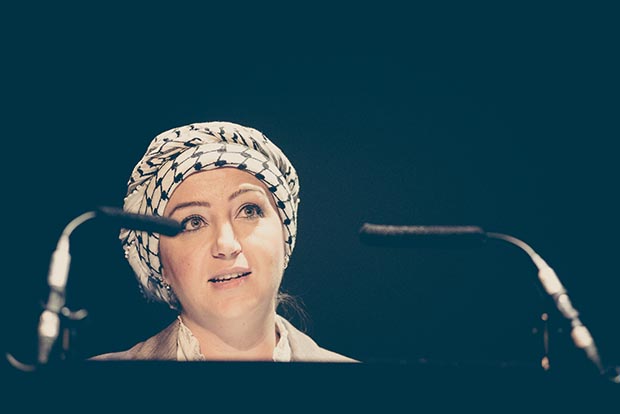
2016 Freedom of Expression Journalism Award winner Zaina Erhaim (Photo: Elina Kansikas for Index on Censorship)
Index on Censorship is appalled by the decision of UK border officials to confiscate the passport of Syrian journalist, Zaina Erhaim. The Syria coordinator for the Institute of War and Peace Reporting, Erhaim has been recognised by a number of organisations internationally for her work training citizen journalists to report on the conflict within Aleppo.
Index invited Erhaim, in her capacity as winner of this year’s Freedom of Expression Awards, to an event at Write on Kew Festival to speak about her experiences alongside veteran journalist Kate Adie.
When Erhaim arrived in the UK on Thursday 22 September for the event she was detained by the UK Border Agency (UKBA) and questioned for an hour before UKBA confiscated her passport. Erhaim was told that the passport had been reported by the Syrian authorities as stolen and therefore UKBA was compelled to retain it and return it to the Syrian government.
Erhaim had her old passport, which remains valid but is effectively unusable because the pages are filled, and was able to enter the UK for the debate. Further travel may be impossible, however, as Erhaim no longer has a passport with which to apply for a new visa to enter Europe.
When Erhaim challenged this decision, she was told to seek consular advice from the Syrian government in Damascus.
“We are extremely disappointed by the treatment of Zaina by border officials. It seems quite astonishing that the UK would accede to a request from a government whom it has only this weekend accused of being complicit in war crimes – especially when it is clear that the Syrian government is using tools, such as passport rescindments, to harass those who oppose or expose its behaviour,” Jodie Ginsberg, CEO of Index on Censorship, said.
Index will be raising the matter with the Home Office and Foreign and Commonwealth Office.
If you would like to write a letter in support of Zaina Erhaim, address your correspondence to:
Rt Hon Amber Rudd MP
Secretary of State for the Home Department
Direct Communications Unit
2 Marsham Street
London
SW1P 4DF
public.enquiries@homeoffice.gsi.gov.uk
Rt Hon Boris Johnson MP
Secretary of State for Foreign and Commonwealth Affairs
King Charles Street
London
SW1A 2AH
fcocorrespondence@fco.gov.uk
More about Zaina Erhaim
Women on the front line: Zaina Erhaim and Kate Adie on the challenges of war reporting
Zaina Erhaim: “I want to give this award to the Syrians who are being terrorised”
#IndexAwards2016: Zaina Erhaim trains Syrian women to report on the war
26 Sep 16 | Volume 45.03 Autumn 2016 Extras
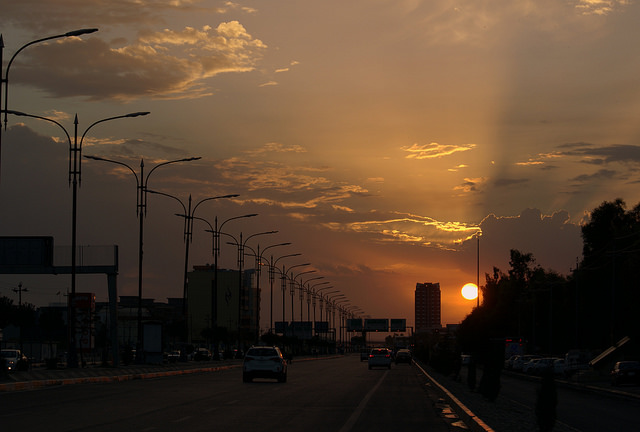
Erbil, Iraq. Photo: Alan Farhadi/Flickr
Foreign correspondents often rely on “fixers” to help them report from war-torn countries. But, as Caroline Lees reveals in the new issue of Index on Censorship magazine, they can be targeted as spies if their names become known locally.
In this clip one Iraqi fixer, who has worked with foreign media ranging from Vice to National Geographic, tells Index about the gamble he takes on each byline with IS territory just an hour away.
Order your full-colour print copy of our anonymity magazine special here, or take out a digital subscription from anywhere in the world via Exact Editions (just £18* for the year). Each magazine sale helps Index on Censorship fight for free expression worldwide.
*Will be charged at local exchange rate outside the UK.
Copies will be available at the BFI, the Serpentine Gallery, MagCulture, (London), News from Nowhere (Liverpool), Home (Manchester), Calton Books (Glasgow) and on Amazon. Each magazine sale helps Index on Censorship continue its fight for free expression worldwide.
The full contents page of the magazine can be read here.
23 Sep 16 | Azerbaijan, Azerbaijan News, Cyprus, Europe and Central Asia, France, Mapping Media Freedom, mobile, News and features, Russia
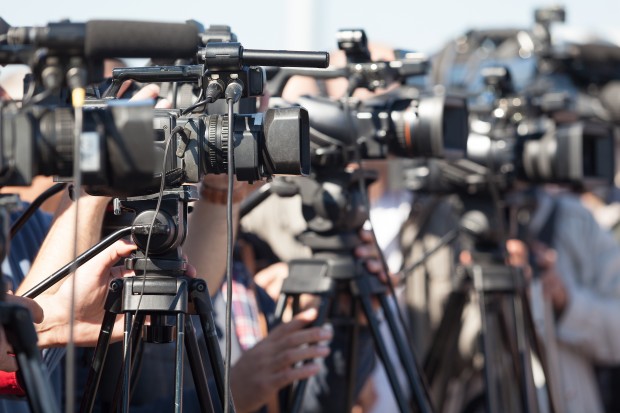
Each week, Index on Censorship’s Mapping Media Freedom project verifies threats, violations and limitations faced by the media throughout the European Union and neighbouring countries. Here are five recent reports that give us cause for concern.
The right-wing National Front (FN) party of France held its summer conference in Fréjus earlier this month. On 16 September the party refused to allow access to the independent media website Mediapart and the Quotidien television programme. The party has denied access to Mediapart in the past due to its critical reporting on the party.
Journalists’ societies of Radio France, le Monde, le Figaro, Libération, le Parisien, les Echos, Courrier International, AEF, France 2, France 3, TF1, Itélé/Canal+ denounced the ban and said they hoped it would not happen again. The FN has refused to grant access to journalists in the past despite this being against the law.
Regardless of the party’s attempt to keep Mediapart from the summer conference, the website claims they hired a freelance writer to cover the event.
Vladimir Romensky was removed by police from a Russian polling station on 18 September. Romensky is a reporter for the independent television channel Dozhd and was sent to the polling station to investigate potential voter fraud. He was responding to rumors that ballot stuffing had occurred at the site.
When Romensky attempted to enter he was approached by a man who refused to introduce himself and did not allow Romensky or his camera crew to access the polling station. A nearby police officer then intervened and demanded to see Romensky’s documents. Despite having all the necessary documents for his camera crew and himself, the police officer called armed guards and pushed the crew out of the station.
Dmitry Korotkov, a reporter for the Russian news site Fontanka, was arrested in St Petersburg on 18 September while investigating voter fraud.
Korotkov was looking into information about carousel voting, which occurs when an organised group of voters travels to different voting districts to repeatedly vote, even though they are not registered in that district. Fontanka discovered that voters were given four ballots at a certain polling station after revealing a special stamp on their passports to polling officials.
Korotkov was able to obtain the passport stamp and received four ballots at the designated polling station even though he was not registered in the specific district. In response, the polling official offered for him to sign as another voter.
Korotkov revealed to the polling official who he was and the fraud that was occurring. The official promised to investigate the situation and called the police, however Korotkov was detained instead. They charged him with illegally obtaining ballot papers.
At around 2am on 19 September, crime reporter Dina Kleanthous’ car was set on fire by an unknown arsonist.
Kleanthous is a reporter for the online news site Reporter Online. She believes the act is not personal, but a response to her work. Kleanthous had recently been receiving threats regarding a story she was covering.
Dunja Mijatović, a representative for the Freedom of Media in the OSCE, said: “This blatant attempt to coerce a journalist who is reporting on news of public interest is simply unacceptable, I urge the authorities to investigate this incident thoroughly and bring to justice those responsible.”
Hilal Mammadov, the editor-in-chief of the independent newspaper Tolyshi Sado, was summoned by police on 19 September. The newspaper covers the ethnic minority of Talysh in Azerbaijan.
Mammadov is a former political prisoner, sentenced to five years in prison in 2013 on spurious charges of “illegal selling of drugs”, “high treason”, and “incitement to national, racial, social, and religious hatred and hostility”. Mammadov was pardoned in March 2016.
After being summoned on 19 September, Mammadov claims the police asked him whether he was a part of a “secret opposition“ and he was forced to give the names of his family to the officials.
23 Sep 16 | Events
[vc_row][vc_column][vc_column_text] The award-winning improvised musical Showstopper! has partnered with Index on Censorship to celebrate free expression this autumn.
The award-winning improvised musical Showstopper! has partnered with Index on Censorship to celebrate free expression this autumn.
Offering a brand new, no-holds-barred, spontaneously improvised musical every night, the cast transforms audience suggestions into an all-singing, all-dancing production with unpredictable and hilarious results.
Showstopper! has delighted audiences across the globe, enjoyed nine years as an Edinburgh Fringe must-see phenomenon, a BBC Radio 4 series and a critically acclaimed West End run at London’s Apollo Theatre. In 2016 it won an Olivier Award for Best Entertainment.
In support of Index on Censorship, proceeds from a limited number of special tickets for upcoming performances will go to support our work defending free expression internationally.
★★★★★ “Had me weeping with laughter… you absolutely have to go.” – Mail on Sunday
★★★★★ “Achingly funny… These guys have to be seen to be believed.” – Time Out
★★★★★ “So polished, it defies belief.” – Daily Telegraph
★★★★★ “Joyous, uproarious” – Independent on Sunday
★★★★ “Magical. Properly funny. A triumph.” – The Times[/vc_column_text][/vc_column][/vc_row][vc_row][vc_column][vc_column_text css=”.vc_custom_1480698868177{border-top-width: 2px !important;border-right-width: 2px !important;border-bottom-width: 2px !important;border-left-width: 2px !important;padding-top: 5px !important;padding-right: 5px !important;padding-bottom: 5px !important;padding-left: 5px !important;border-left-color: #0a0202 !important;border-left-style: solid !important;border-right-color: #0a0202 !important;border-right-style: solid !important;border-top-color: #0a0202 !important;border-top-style: solid !important;border-bottom-color: #0a0202 !important;border-bottom-style: solid !important;border-radius: 5px !important;}”]
WHERE: Lyric Theatre, Shaftesbury Avenue, London, W1D 7ES (Map)
WHEN: 12 December – 7:30pm. Running time 90mins plus interval. Age guidance 12+.
TICKETS: £50 (buy yours here). All seats are Band A and half of the proceeds of every ticket sold here will be donated directly to Index on Censorship. You can also book by phone by calling 0330 333 4812 and quoting “INDEX” to the box office.
[/vc_column_text][/vc_column][/vc_row][vc_row][vc_column][vc_column_text]

With special thanks to Divine Chocolate.
[/vc_column_text][/vc_column][/vc_row]
22 Sep 16 | Events
For the London Press Club’s monthly social evening, Index on Censorship has teamed up with the Frontline Club to present a discussion examining the changing role of the foreign correspondent within a rapidly evolving media landscape.
In the past twenty years budget cuts across the foreign news industry have seen the near-demise of Western foreign correspondents posted abroad. In their place, local-national stringers have become increasingly important providers of foreign news stories. While the nature of conflicts changes and reporting from high-risk zones becomes more dangerous, the traditional model of the foreign correspondent has shifted. The majority of foreign news is no longer gathered by traditional foreign correspondents posted abroad, but by local nationals who were born and raised in the country they report on.
Is the foreign correspondent an endangered species in the news industry? What new models of foreign reporting are emerging alongside new information-gathering technologies? We will be joined by an expert panel to discuss trends in the industry and the future role of the foreign correspondent.
Chair: Rachael Jolley, editor of Index on Censorship magazine.
Speakers:
Kim Sengupta
Defence correspondent at The Independent.
Dr Haider Al Safi
London-based Iraqi journalist and media consultant covering middle eastern politics.
Caroline Lees
Former news and foreign correspondent who has worked as South Asia correspondent for the Sunday Times.
Samira Shackle
London-based freelance journalist who has reported extensively on Pakistan over the last five years
When: 1 November 2016, 7pm
Where: The Frontline Club (map)
Tickets: This is a free ticketed event. Fully booked.
22 Sep 16 | Awards, Fellowship, Fellowship 2016, Middle East and North Africa, mobile, News and features, Yemen
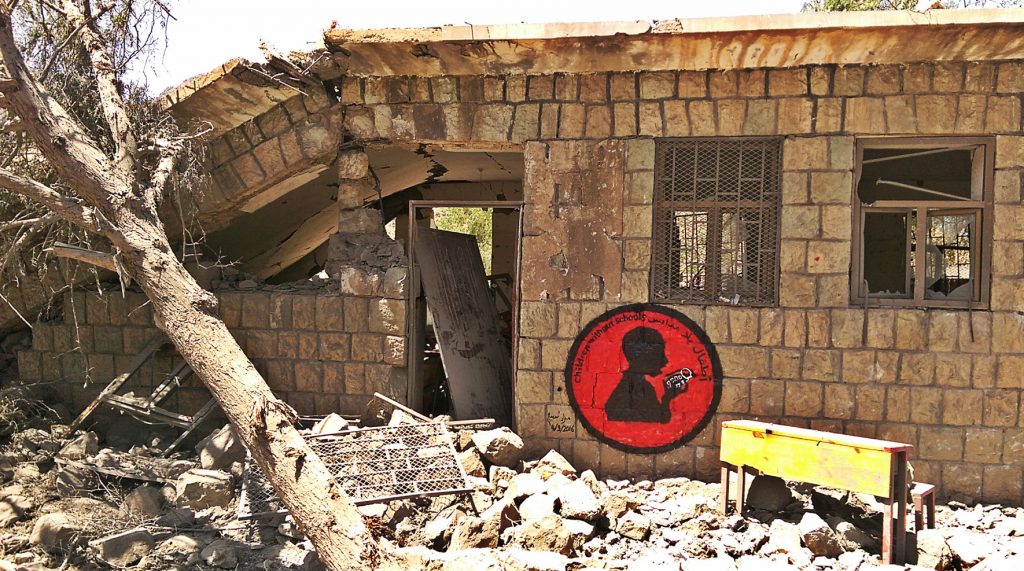
Credit: Ruins campaign. Bani Waleed, September 2016
On 3 September 2016, a group of Houthi rebels convened a meeting at al-Najah School in the al-Haima district of Bani Waleed, a local witness told Murad Subay, street artist and winner of the 2016 Index on Censorship award for arts, that the men entered the school without permission.
“We are not with any of the warring parties – we are caught in the middle,” the witness said.
Soon after, the school was destroyed in an airstrike carried out by the Saudi Arabian-led military coalition, killing one disabled student and adding 1,200 to the more than 3.4 million already forced out of education in the country as over 3,600 schools have been forced to close in the course of the war.
“Can you imagine? These are the soldiers of the wars to come,” Subay told Index. “Without education, these children could become tomorrow’s fighters and tools in the hands of extremists.”
At dawn on 4 September Subay travelled to Bani Waleed to create a mural on what remained of al-Najah.
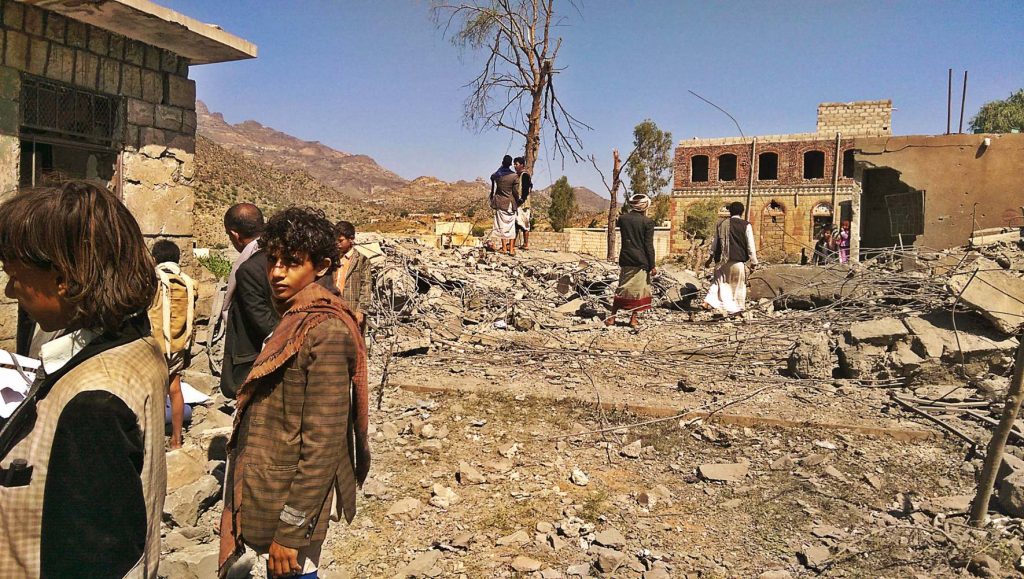
Credit: Ruins campaign. Bani Waleed, September 2016
“When we got there I asked some of the students what they were going to do now that their school was destroyed and some told me they will go to Sanaa while others said they will travel to surrounding villages,” Subay said. “But it will be much more difficult for the 400 girls who attended the school because traditions in Yemen mean they will not be able to travel alone, making it impossible for them to go to other villages to study.”
|
Murad Subay is the 2016 Index on Censorship Freedom of Expression Arts Award-winner and fellow. His practice involves Yemenis in creating murals that protest the country’s civil war. Read more about Subay’s work.
|
|
Destroying schools isn’t a big deal for the warring parties, the artist added. “Some of the children of those leaders who shout ‘death to America’ are studying at the best universities in the world, including in the USA, while each bombed school in Yemen – especially big ones like al-Haima – will take years to rebuild.”
The situation is made even more difficult in a time of war when resources and building materials are almost impossible to come by. “Even if the West stopped supplying weapons to Saudi Arabia today and patted themselves on the back saying ‘we are doing good’, Saudi Arabia already has enough to wage wars for another 150 years if it wants.”
If there is any hope for peace to prevail and schools, hospitals and other buildings belonging to the people are to be rebuilt, countries like Britain and America should take a step further and tell Saudi Arabia “to show restraint”, Subay said.
“While Saudi Arabia is doing the majority of the destruction, all sides of the war in Yemen must take responsibility.”
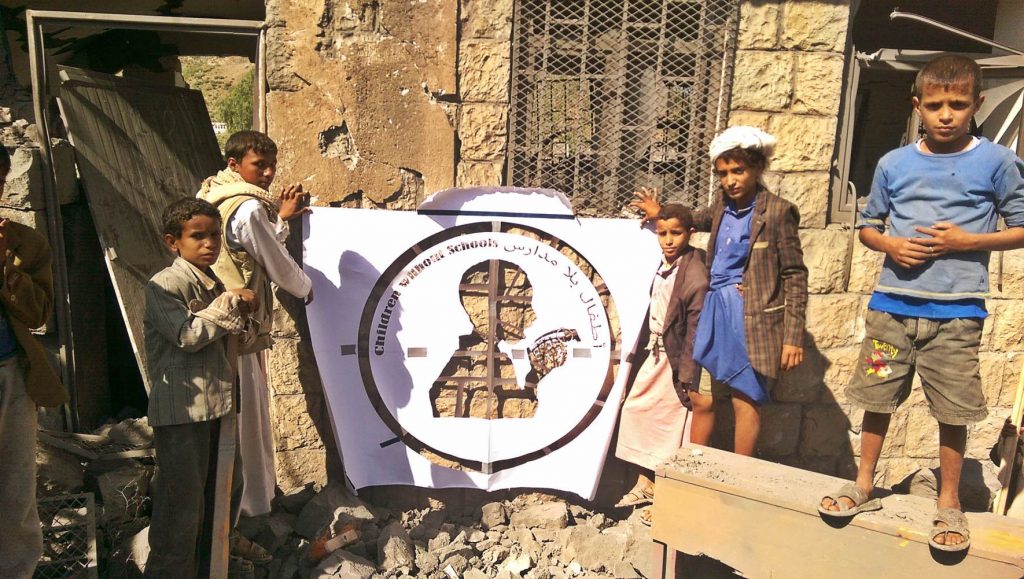
Credit: Ruins campaign. Bani Waleed, September 2016
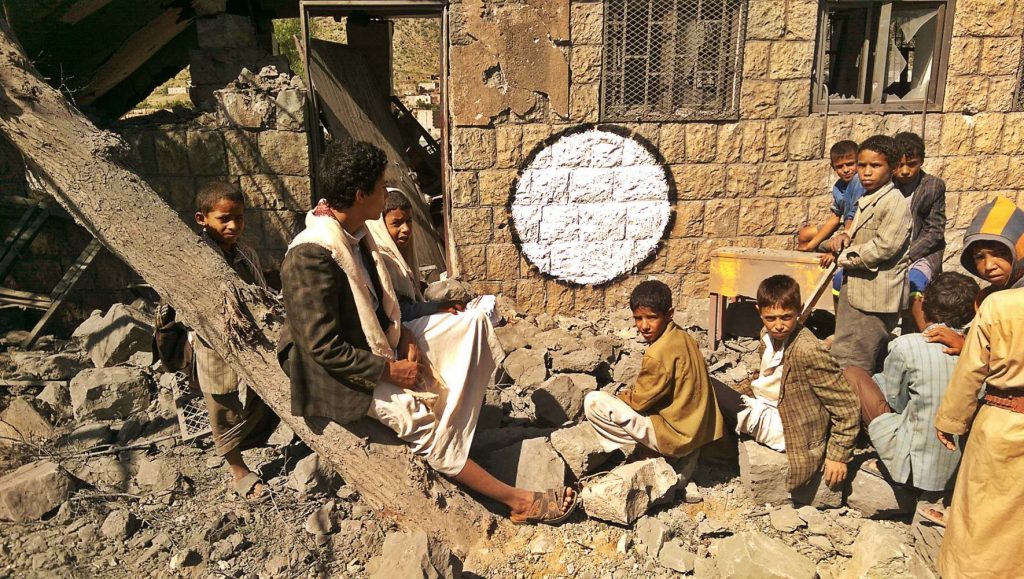
Credit: Ruins campaign. Bani Waleed, September 2016
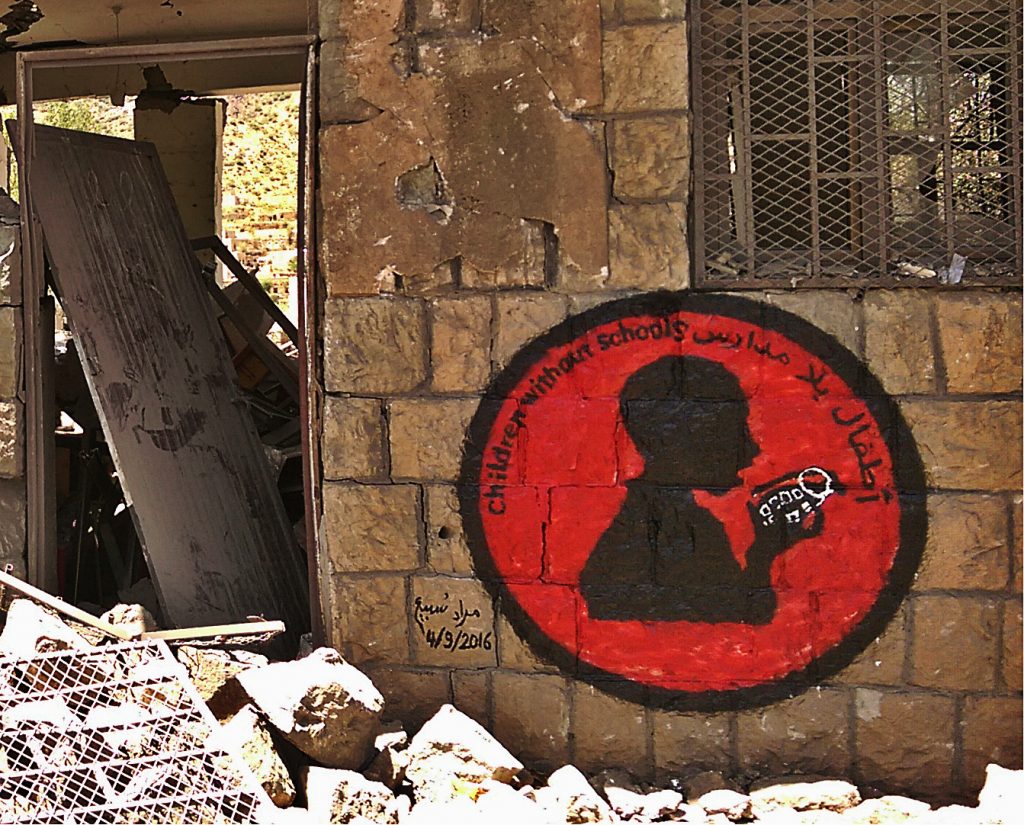
Credit: Ruins campaign. Bani Waleed, September 2016
The mural completed on 4 September depicts a child holding a hand grenade in place of a book, with the words “Children without schools” painted in English and Arabic.
When painting with fellow artists from the Ruins campaign – set up in May 2015 in collaboration with fellow artist Thi Yazen to paint on the walls of buildings damaged by the war – on 25 August, the group were arrested and interrogated by a local militia.
“They asked us to sign a letter with our fingerprints promising that we would not return again without permission,” Subay explains. “I actually did have permission from a local tribal leader but they wouldn’t listen.”
The artists were told if they returned they would be punished.
“My friends were very afraid and some of them said even with permission they would not return,” Subay said. “It was a strange situation for them.”
Subway himself isn’t put off and is already looking forward the next Ruins campaign, wherever that may be.
The last time he spoke with Index, Ruins had just completed a series of murals in front of the Central Bank of Yemen to represent the country’s economic collapse. Soon after the murals were finished, Houthi rebels defaced two out of the three works of art, writing “Samidoon” (صامدون), meaning “steadfast”, which is one of their slogans.
Assessing the situation in Yemen and the many different sides of the conflict, Subay said: “It is very difficult. Every night we hear airstrikes here and there, but we go on with our lives.”
“But any day when I can paint is a good one.”
Nominations are now open for 2017 Index on Censorship Freedom of Expression Awards and will remain open until 11 October. You can make yours here.

Winners of the 2016 Freedom of Expression Awards: from left, Farieha Aziz of Bolo Bhi (campaigning), Serge Bambara — aka “Smockey” (Music in Exile), Murad Subay (arts), Zaina Erhaim (journalism). GreatFire (digital activism), not pictured, is an anonymous collective. Photo: Sean Gallagher for Index on Censorship
Ryan McChrystal is the assistant online editor at Index on Censorship
21 Sep 16 | Bahrain, Bahrain News, Middle East and North Africa, mobile, News and features

Bahraini human rights defender Nabeel Rajab (Photo: The Bahrain Institute for Rights and Democracy)
Prince Charles is to make an official visit to Bahrain in November despite the escalating human rights crackdown in the country. This endorsement comes after Queen Elizabeth sat next to the king of Bahrain at her 90th birthday celebrations this summer.
Last week, the UN Human Rights Council commissioner Zeid Ra’ad Al Hussein expressed grave concerns about the country: “The past decade has demonstrated repeatedly and with punishing clarity exactly how disastrous the outcomes can be when a government attempts to smash the voices of its people, instead of serving them.”
Today, Sayed Ahmed Alwadaei, director of advocacy at the Bahrain Institute for Rights and Democracy, told The Times: “The timing of Prince Charles’s visit suggests that the major human rights violations in 2016 are not in the British monarchy’s mind.”
Here are just a few things Index on Censorship would encourage the prince to keep in mind ahead of his trip:
1. The treatment of Nabeel Rajab
Human rights campaigner Nabeel Rajab, who has been arrested multiple times because of his peaceful activism, has been detained since 13 June for comments he made on Twitter. Charges brought against him for his tweets, and even retweets, include spreading “false or malicious news, statements, or rumours”, “offending a foreign country” and “offending a statutory body”.
Rajab was also recently charged with “defaming the state” after a critical op-ed he wrote appeared in The New York Times.
Just last week, the UK government was urged by a group of 50 NGOs to put pressure on Bahrain over Rajab’s treatment. With news of the state-sanctioned Prince Charles visit, it appears these calls have of fallen on deaf ears.
Rajab is expected to be sentenced at his next court hearing on 6 October. He faces more than 15 years in prison.
2. The detention of critics
The Bahraini government has repeatedly used prison as a weapon to silence its critics. Opposition activist Zainab Al-Khawaja was sentenced to three years in prison in December 2014 for “insulting the king” after she ripped up a picture of him. Though she has now been released, her father Abdulhadi Al-Khawaja, a human rights activist and a member of the Bahrain 13, remains in prison along with over 3,500 other prisoners of conscience.
On 22 June 2011 a military court sentenced all members of the Bahrain 13 to between five years and life in prison, on trumped-up charges of attempting to overthrow the regime, “broadcasting false news and rumours” and “inciting demonstrations”. All but two of them remain behind bars.
Last year, the Liberties and Human Rights Department of Al-Wefaq National Islamic Society recorded a total of 1,765 arrests by security services for reasons related to the opposition political movement, including the detention of 120 children and five women.
3. Rendering critics stateless
Another abusive tactic used by the government of Bahrain is to revoke the citizenship of many of its critics. This is illegal under several international agreements, including the Universal Declaration of Human Rights and the International Covenant on Civil and Political Rights. Regardless, 208 Bahrainis were rendered stateless in 2015 alone.
Since amending its citizenship law in 2014, Bahrain’s judges can strip citizenship from anyone convicted under anti-terrorist laws. However, the law does not properly define “terrorism” and several of those subjected to this fate in 2015 were convicted under vague terms such as “inciting and advocating regime change” to “defaming brotherly countries”.
Most of those rendered stateless have been deported, along with their families.
4. Censoring the internet
Named by Reporters Without Borders as an “enemy of the internet“, Bahrain has been busy clamping down on the web over the last few years. Despite being one of the best-connected countries in the world from a technical perspective, Freedom House gives the country an online freedom rating of 72, with 100 being the worst possible score.
News, human rights and opposition websites are routinely blocked, with estimates putting the total number at over 1,000. Social media users have been arrested and had posts forcibly removed, including those of the satirical account @Takrooz whose only post is now: “They tortured me in prison.”
The government is also working on a new Russian-inspired default search engine that would allow it to filter results without the cooperation of Western-based companies such as Netsweeper, which was exposed by the Associated Press as a facilitator of Bahrain’s censorship program.
21 Sep 16 | Events, mobile
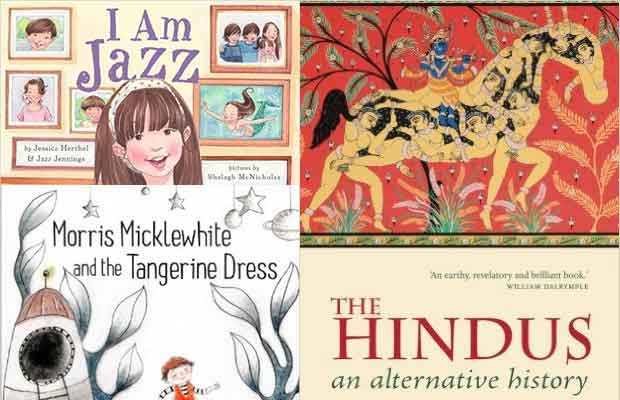
What’s it like to be an author of a banned or challenged book? How can librarians support authors who find themselves in this situation? To mark Banned Books Week, Vicky Baker, deputy editor of Index on Censorship magazine, will chair an online discussion with three authors on 29 September, followed by a Q&A.
It is free to join, although attendees must register in advance.
The contributors are:
- Christine Baldacchino, author of Morris Micklewhite and the Tangerine Dress, a children’s book about a boy who likes to wear a dress, which “highly concerned” some parents when it was read in US schools.
- Wendy Doniger, a professor of religious history at the University of Chicago and author of numerous academic works. Her 2009 book The Hindus: An Alternative History was recalled, and destroyed, by the publisher Penguin India in 2014, after a lawsuit was filed, claiming the work denigrated Hinduism
- Jessica Herthel, a graduate of Harvard Law School, who co-wrote the children’s picture book I Am Jazz, with Jazz Jennings, a transgender activist and YouTube/television star. In 2015, an elementary school in Wisconsin cancelled a reading of the book after a group threatened to sue.
The webinar has been arranged by Sage Publications, in conjunction with the American Library Association.
When: Thursday 29 September, 4pm GMT / 11 EST
Where: Online
Tickets: Free, registration required.
21 Sep 16 | Magazine, mobile, News and features, Volume 45.02 Summer 2016 Extras, Youth Board
In the latest issue of Index on Censorship magazine, The Unnamed: Does anonymity need to be defended?, Index’s contributing editor for Turkey, Kaya Genç, explores anonymous artists in Turkey. In the piece the artists discuss how vital anonymity is in allowing them to complete their more controversial work. The Index on Censorship youth advisory board have taken inspiration from this piece for their latest task, in which they investigate anonymous art around the world.
Keizer by Constantin Eckner
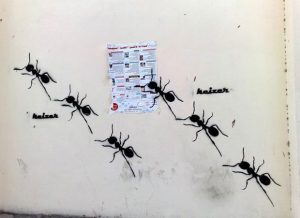
Ants feature in Keizer’s work to sybolise “the forgotten ones, the silenced, the nameless, those marginalised by capitalism”. Image: Keizer
Prior to the January 25 Revolution political street art was anything but common in Egypt, yet it has proliferated in public spaces in the aftermath of the revolution. One of the most productive street artists in Cairo is Keizer, who has gained popularity and notoriety in recent years. Like Banksy and other street artists, he uses the well-known stencil technique to empower his fellow countrymen, and people in general, with his thought-provoking work. He likens people to ants, which are featured in most of his graffiti. Keizer explains on his Facebook account that the ant “symbolises the forgotten ones, the silenced, the nameless, those marginalised by capitalism. They are the working class, the common people, the colony that struggles and sacrifices blindly for the queen ant and her monarchy.”
Asked about the reason for protecting his identity, Keizer said: “I am very concerned over my safety and the repercussions of street art which I’ve already had a taste of, especially with this current regime. Including death threats,
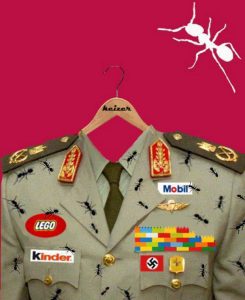
Egyptian street artist Keizer has gained popularity in recent years. Image: Keizer
my twitter account was hacked twice. In the past five years of working on the street I’ve been caught once. I came out of it with a few bumps and bruises, nothing major. I consider myself lucky that I came out one day later.
“You can imagine that being caught here is very different than being caught in Europe. There is no proper procedure and that makes you a victim of the person handling you, and the uncertainty of what comes next. Graffiti is a grey area here, they don’t have any definition or classification for it in the books, so they make it up as they go along, taking you for the fear ride. It’s all under vandalism, so they can make it look small or escalate it to exaggerated levels. For instance, you can be dubbed as a political traitor; it can be considered racketeering; they can glue your name to any political movement unpopular with the people…etc.”
Tall walls, low profiles: Icy and Sot by Layli Foroudi
Icy and Sot describe themselves as stencil artists from Tabriz, Iran. As for their identities, they reveal only that they are brothers, born in 1985 and 1991. Their work is created under pseudonyms in countries around the world, including Iran, USA, Germany, Norway, and China, on legal and illegal walls as well as in galleries.
The anonymous duo, who paint on themes like human rights, censorship, and justice, say that charges against artists in Iran make going public risky.
“Pseudonyms help us to keep a low profile,” the brothers explained in an interview with ArtInfo, “Being arrested in Iran is completely different, because they charge you with crimes that you have not even committed, like Satanism or political crimes.”
Their work often uses striking human faces in black and white to make statements about politics and the environment, to call for peace, and to direct messages at the government of Iran. In 2015, Icy and Sot used their art to protest for freedom of expression in Iran, prompted by the arrest and 18-month imprisonment of Atena Farghadani, an Iranian artist who was detained for publishing a cartoon that satirised the Iranian government as animals. In solidarity, they stenciled a tribute piece depicting Farghadani with a backdrop of protesters on a wall in Brooklyn.
Maeztro Urbano’s fight to change a criminal image by Ian Morse.
In the most recent data, Honduras has the highest homicide rate in the world, with 84 intentional homicides per 100,000 people in 2013. The prominence of drug trafficking and ubiquity of poverty does not improve its reputation.
To some Hondurans, their country’s international image has done nothing but hurt citizen’s attempts to improve daily life in the country’s bustling cities and lively cultural centers. Maeztro Urbano and his friends became the face of an urban street art project to disrupt the atmosphere of crime and reveal another side of the country outside of the headlines.
His projects range from adjusting street signs promoting gender equality to vandalising billboards with corrupt politicians, to wall graffiti showing the effect of violence on children. Working his day shifts in the advertising industry, Maeztro Urbano said he wants to contribute more to his country than proliferating consumerism.
“Change should start within society. With each individual,” El Maestro – as he is also called – told The Creators Project. “To have respect for the lives of others, to respect the right to sexual diversity, to a better education.”
“If we don’t change that as a society and as individuals, we will never be able to change as a country.”
Assailants in Honduras have not been very hospitable to those reporting on crime or those wishing to express their identity. Faced with police harassment and shootings from unknown attackers, Maeztro Urbano chooses to wear a mask while he works to spread messages of hope around the country.
Bleeps.gr: Over a decade of political artivism in Athens by Anna Gumbau.
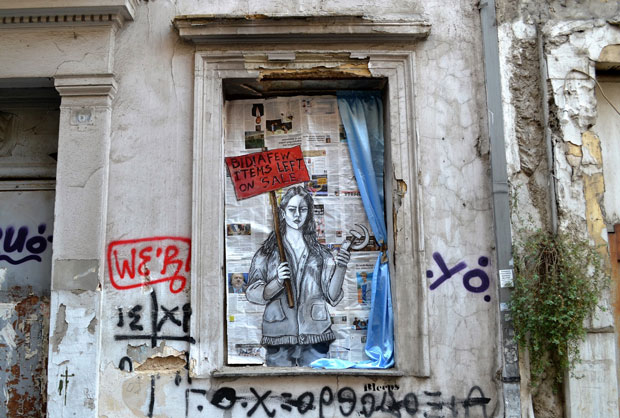
Bleeps.gr is one of Greece’s most prominent street artists, having painted murals on the streets of Athens for over 10 years. Image: Bleeps.gr
“I have been radically oriented to the political discourse, utilising the public sphere, and I am not afraid or discouraged”, Bleeps.gr, one of the most prominent Greek street artists, told Index.
Bleep.gr has been designing murals, that are mostly critical of the austerity policies imposed to Greece, on the streets of Athens for over 10 years. The Greek social turmoil has had a strong influence on his artwork, not only in his scenes, but even in his methods. “I buy very cheap materials and can’t afford those impressive equipment to create a mural”, he said in an interview with Street Art Europe.
Bleeps.gr chooses to use a pseudonym as an attempt to challenge “the institutionalised perception of the identity”, he told Index. While he is not afraid of the state authorities, he points at art institutions, such as galleries, exhibitions and festivals, who reject and exclude his art. “Most of the censorship I have received has come from other artists, especially the ones related to systemic initiatives, who in the past years have removed all of my works from the city center” he said. Greek political street artists often suffer from the exclusion of art galleries and exhibitors; in the summer of 2013, the CRISIS? WHAT CRISIS? street art festival in Athens, which celebrates the value of street art in the current political happenings, invited 20 artists from different European countries but failed to invite any Greek artists.
Nevertheless, Bleeps.gr stresses the fact that the internet “has provided a virtual field of allocation”, and most of the political street art discourse happens there.
Bleeps.gr highlights the mechanisms of such institutions to “absorb street artists” and make them become part of the art “business”, adding: “the majority of them nowadays serve gentrification policies and turn policies and turn political art into a spectacle for tourist pleasure”.
King of Spades by Sophia Smith-Galer.
When it comes to anonymous artists, the art tends to speak far louder than any speculation into the artist themselves. This anonymous artist in Lebanon is no Arab Banksy that lurks tantalisingly close to the limelight; this artist could quite literally be anyone, and the lack of anybody claiming the piece as their own is revelatory of the grave reality of artists in developing countries that test the patience of despots and tyrants.
Despite its tired and no longer relevant label “Paris of the Middle East”, even the dazzlingly artistic city of Beirut, Lebanon, can’t quite get away with hanging something like this banner, depicting the late Saudi Arabian monarch King Abdullah bin Abdul Aziz as a brutal King of Spades. Shortly after its creation in 2013, the Lebanese state prosecutor ordered an investigation to reveal the source of these posters after complaints from Saudi Ambassador Ali Awad Asiri.
It seems that nobody got caught, and nor do I particularly want to dwell on what would have happened to the artist if they had. But in the Middle East, such a daring artistic expression must be forbidden fruit in a region of gagged political artistry; demonstrated no better than in this mysterious artist who gambled with the assumed impunity of that gentleman with the bloodied scimitar.
Dede Bandaid by Shruti Venkatraman.
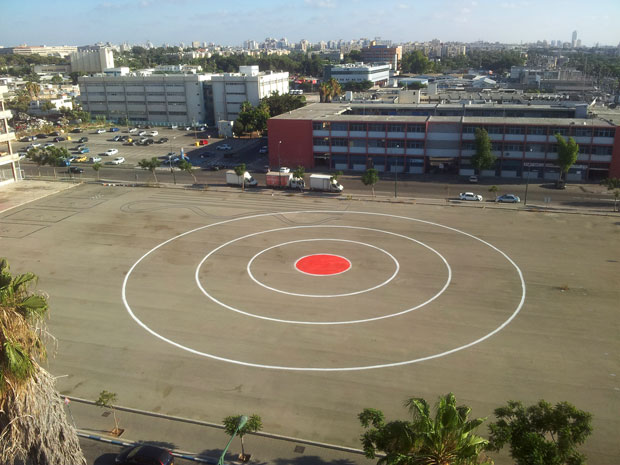
One of Dede Bandaid’s most well known works, a missile target painted in the middle of a large car park, a reference to the Gaza conflict in 2014. Image: Dede Bandaid / Wikicommons
Dede Bandaid is an anonymous Israeli artist who has added colour to Tel Aviv’s streets with thought provoking and politically relevant street art. His artistic career began in 2000 during his compulsory military service, and most of his earlier pieces demonstrated a clear anti-establishment sentiment. His more recent works, following the end of his stint in the military, aim to communicate social and political messages. One of his most well known works is a missile target painted in the middle of a large car park, a reference to the Gaza conflict in 2014.
Dede enjoys using public spaces as a canvas as this approach allows freer and more controversial expression, while also being accessible to and viewable by a larger audience especially when the street art is photographed and its images are circulated online. He also makes use of traditional symbols of peace, like the white dove, and frequently incorporates Band-Aids that represent healing and remedy in his artwork, with “Bandaid” being the pseudonym he signs on all his pieces. Over time, Dede’s style has evolved from stencilling to free-hand painting and collage and he interestingly also exhibits certain pieces in galleries across the world.
Cabbage Walker in Kashmir by Niharika Pandit.
A pheran-clad man walks around with a cabbage on a leash in the neighbourhoods of Srinagar, Kashmir. This performance act that he presents is inspired by Chinese artist Han Bing’s “Walking the Cabbage” social intervention work. While Bing chose to walk the cabbage to reflect on the changing values in the Chinese society, where once cabbage was a subsistence food product but is now only embraced by the poor, in Kashmir, this anonymous artist aims to normalise the cabbage walking to show the absurdity of militarisation in the region. Both the performances employ cabbage as an element of satire to expose the irony inherent in what how elitism and militarisation come to be normalised in societies across the world.
The Kashmiri Cabbage Walker writes on his blog, “I as a Kashmiri am willing to recognise walking the cabbage as part of the Kashmiri landscape but I will never accept the check posts, the bunkers, the army camps, the torture centers, the barbed wire, the curfews, the arrests, the toxic environment of conflict and war, as part of the same.”
This performance artist chooses to remain anonymous as it helps in focusing on the message and not the messenger. The Kashmiri Cabbage Walker says that he represents all Kashmiri lives under militarisation thereby revealing the artist’s identity becomes unimportant here.
Cracked pavements in Budapest by Fruzsina Katona.
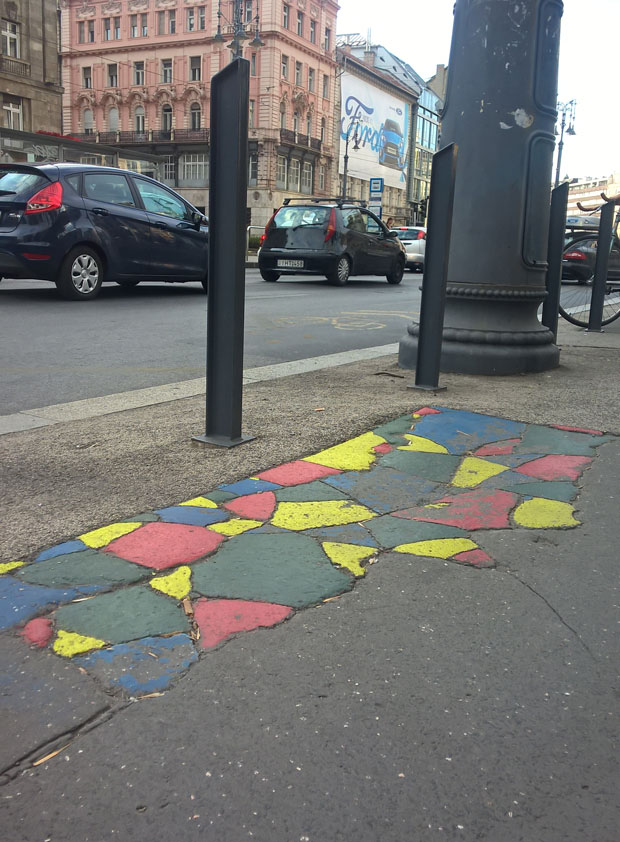
Anonymous volunteers have joined the satirial political party the Two-Tailed Dog party (MKKP) to paint cracked pavement on the streets of Budapest. Image: Fruzsina Katona
Anonymity does not necessarily mean that one is trying to hide his or her identity. Sometimes the identity of the person is utterly irrelevant. In Budapest, several anonymous volunteers are painting the streets of the city.
The pavement on the streets of the Hungarian capital are falling apart, ruining the image of the city and endangering those who walk on it. Authorities are known to do very little to fix the problem, but something had to be done. Hungary’s satiric political party, the Two-Tailed Dog party (MKKP) called for action and its artsy, anonymous volunteers started colouring the cracked pavement pieces resulting in dozens of cheerful spots across the city.
Unfortunately, there are some who find quarrels in a straw, and the police were called on the ad-hoc artists while they were peacefully decorating the pavement in a touristic neighbourhood. Now the volunteers are being prosecuted with vandalism.
But we still do not know their identity or how many of them are out decorating. All we know is that now we look at colourful patches of pavements while running our errands, instead of the sad and ugly cracked pavements.









 The award-winning improvised musical Showstopper! has partnered with Index on Censorship to celebrate free expression this autumn.
The award-winning improvised musical Showstopper! has partnered with Index on Censorship to celebrate free expression this autumn.











